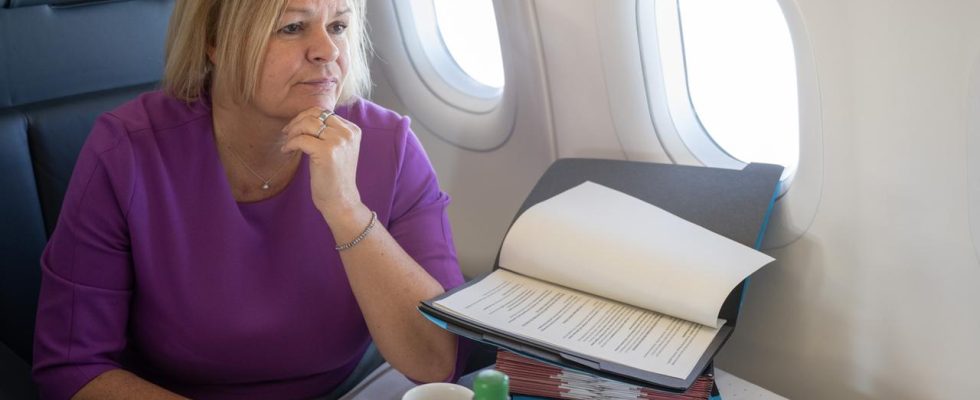Georgians only very rarely receive asylum in Germany. A migration agreement should now make deportations easier – and at the same time simplify the immigration of workers.
Negotiating a migration agreement is a complex matter. There is no blueprint for this; Joachim Stamp has to approach each country individually. What does Germany want, what does the negotiating partner want and where do we meet?
Stamp is the federal government’s special representative for migration agreements. The FDP politician has been in office since February, and shortly before the end of the year his first completed agreement is on the table – the one with Georgia.
Since 2017, citizens from the former Soviet republic of Georgia have been allowed to travel to the European Union without a visa for a period of three months. Georgians who want to apply for asylum in the EU can enter the country legally by bus or plane.
German bureaucracy overloaded
More than 15 percent of all rejected asylum applications are currently made by people from Georgia and the Republic of Moldova. Around 8,000 asylum applications per year come from people from Georgia. However, because their protection rate is low, more than 99 percent of applications are rejected.
Even though the number of 8,000 is comparatively small and the applications are usually rejected, people receive financial support for several months – and the applications have to be processed. If these applications were to be eliminated in the future, this would relieve the burden on the Federal Office for Migration and Refugees (BAMF).
| country | Total initial and subsequent applications |
|---|---|
Syria | 84,739 |
Türkiye | 46,237 |
Afghanistan | 45,955 |
Iraq | 10,477 |
Iran | 8,947 |
Georgia | 8,513 |
Russian Federation | 7,629 |
Somalia | 4,766 |
Eritrea | 3,711 |
Source: BAMF
Many well-educated people have left Georgia
With regard to Georgia, Germany had two goals: fewer Georgians should apply for asylum in Germany because they usually don’t get it and the procedures still burden German bureaucracy. Instead, Georgians should immigrate to the regular labor market because Germany lacks skilled workers.
Stamp’s first negotiating offer to the Georgian government was an expansion of the Western Balkans regulation, which would have made it easier for Georgians to access the German labor market. From a German perspective, a sensible move – but for Georgia this idea was completely uninteresting.
The country is already suffering from the “brain drain”: many young, well-educated people have already left the country, and the remaining workers are urgently needed in Georgia itself. The reason for this is, on the one hand, the lack of career prospects and, on the other hand, Georgia is partly occupied by Russia.
The fear of being completely invaded by Russia like Ukraine runs deep among the young generation. That’s why a lot of people left. Many already work in the EU, albeit in sometimes precarious jobs.
Georgia is cooperative with the withdrawal
At this point, German and Georgian interests came together again, says Stamp: The agreement is primarily about the Georgians who have already left their homeland and are now traveling in the EU.
These workers should be invited to the labor market in Germany “especially from the areas of logistics, transport and care, where we ourselves have a shortage.”
The two states have negotiated something like a rallying movement in the pan-European labor market: Georgians who have poorly paid jobs in Poland or Greece, for example, should travel on to Germany in order to get better-paid jobs here.
If that works, both sides win – at least from the perspective of the states. Whether this job offer is also interesting for people from Georgia is a completely different question.
According to the federal government, the country is already cooperating in taking back Georgians who are required to leave the country. This cooperation should be continued. In return, for example, seasonal workers should be given better prospects with the agreement to work in Germany for a certain period of time.
Cooperation should also be strengthened in the training of specialists and in the education sector in general, for example through the exchange of students, trainees and researchers. For this purpose, a bilateral expert group should be set up with Georgia.
Perfect timing
Just a few days before Interior Minister Faeser’s trip to Georgia, the Federal Council agreed to add Georgia and the Republic of Moldova to the list of safe countries of origin. This step is necessary to speed up the asylum procedures for people from Georgia.
At the EU summit in December, the EU states decided to grant Georgia candidate status. Tens of thousands of people celebrated in Georgia’s capital Tbilisi last Friday. Prime Minister Iraqi Garibashvili spoke of a “historic victory”.
In terms of timing, the trip is perfect, says migration researcher Gerald Knaus. Many in the Georgian population are counting on a European future. The Georgian government is less clear about where it stands, says Knaus. After massive protests, the government in Tbilisi withdrew a controversial bill in March that was intended to limit foreign influence on the media and organizations. Critics feared that the blueprint for this would be a Russian law against foreign agents that repressed opposition politicians, activists and organizations there.
With her delegation’s visit at this time, Faeser is making it clear that Germany stands behind the EU Council’s decision and continues to support visa freedom for Georgians, says migration researcher Knaus.
It is now a crucial phase for Georgia to continue to align itself with the democratic EU states and to escape Putin’s sphere of influence. Currently around 20 percent of Georgia is occupied by Russians.
Domestic politics Signal in Germany
In order to have an effect on the number of asylum applications, Germany in particular would have to do its homework after the agreement is concluded, says migration researcher Knaus. For example, the Federal Office for Migration and Refugees carries out relatively hopeless asylum application procedures more quickly so that these applications are never submitted in the first place.
With Georgia classified as a safe country of origin, asylum procedures can now be accelerated. For example, lawsuits against a rejection decision do not have a suspensive effect – that is, affected people can be deported while the lawsuit is still ongoing.
In total, more than 300,000 asylum applications were submitted in Germany between January and November 2023. Most of them come from people from Syria, Turkey, Afghanistan, Iraq and Iran, i.e. from countries with a high protection rate. In comparison, the control effects of the migration agreement with Georgia are likely to remain manageable.
Marcus Engler from the German Center for Integration and Migration Research (DeZIM) sees the agreement above all as a domestic political signal to the German population. “Of course, the special representative for migration agreements, Stamp, is under pressure from the public and certainly from his own government to deliver now,” says Engler.
Stamp also wants to conclude a migration agreement with the Republic of Moldova soon. The federal government is also currently negotiating with Kenya, Colombia, Uzbekistan, Kyrgyzstan and Morocco.
In order to significantly reduce the number of asylum applications, Germany would also have to make agreements with important transit countries and main countries of origin, such as Turkey, says migration researcher Knaus.
Solutions are also needed for escape routes across the Mediterranean. A much more difficult undertaking than the agreement with Georgia. From a human rights policy perspective, cooperation with Libya is currently unthinkable – and also sensitive with countries like Tunisia and Turkey.
Bianca Schwarz, ARD Berlin, currently Tbilisi, tagesschau, December 19, 2023 5:20 a.m


